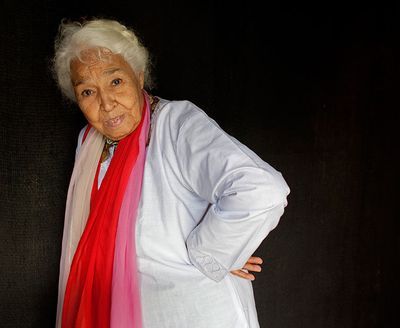Nawal El Saadawi at point zero

Nawal El Saadawi, 2011; Photograph by Richard Pohle/The Times
By ALEXANDER STARRITT
Underground in a bar with exposed brickwork, shiny tiling and hundreds of bare light bulbs massed together on the ceiling, in London's no longer all that trendy area of Shoreditch, a sell-out crowd of a hundred young women has come to listen to the eighty-four-year-old Egyptian psychiatrist Dr Nawal El Saadawi.
The MC describes El Saadawi as one of the foremost feminist thinkers in the Middle East. A prolific author, she has written novels such as Woman at Point Zero (1975), which tells the true story of Firdaus, a prostitute sentenced to death for killing a pimp. For such feminist writings and activism, El Saadawi lost her job; she was imprisoned and forced into exile in America, where she taught ���creativity and dissidence��� at Duke University in North Carolina, then at Harvard, Yale, Columbia and the Sorbonne.
The event has been organized at The Book Club by For Books' Sake, an organization that champions women writers. There is a warm-up act: Cecilia Knapp, who has performed a one-woman show at the Camden Roundhouse about "being a girl". She makes self-deprecating remarks and reads poems from an exercise book about her lovability or unlovability, one about her father and one that is a commission ���about gentrification in certain parts of London���.
Everything shifts when El Saadawi arrives, halfway through one of the poems. She sits on a chair by the door, small, fidgeting, curious, looking around, inspecting Knapp���s shoes, squinting into the crowd. People keep creeping across to greet her. I wonder what Knapp's description of working in a pub in Mile End means to her. Knapp finishes her set; El Saadawi vehemently applauds and then, jumping ahead of the scheduled but already forgotten second act, takes the stage. There's whooping and cheering from the crowd, at which El Saadawi grins in surprise and pleasure.
When she starts speaking she is direct, generous, serious. She is talking about courage (the MC wants to know where you get it from), about imprisonment and exile. Her lexicon doesn���t fit with this room or this time: revolution, dissidence, ���the system���. She is asked "when you look back on your work, what do you think about it?", and replies that when she went to America, students in her classes had read Woman at Point Zero and would come up to her to say that they felt they were Firdaus. This, she says, is ���better than the Nobel Prize���.
Firdaus, in Nawal���s telling, was clandestinely offered a pardon if she would show remorse for killing the pimp, but said, ���I am ready to die, but not to regret���. She was ���the most honourable woman I have ever met���. She struggled to be free from oppression by those around her and all her life she was betrayed ��� by her family, by the law ��� and in the end she was executed.
Nawal wins the audience by telling them these things in the same voice in which she says she doesn���t like teachers or doctors or writers (she herself being all three), or that, during the protests in Tahrir Square, ���I was so happy I went back to my childhood. I thought I was a child. I was eighty at that time, but I felt eight���. In fact, there���s something admirably childlike about the brightness of her enthusiasm, her haste, her peremptoriness. She only loses the crowd when she gets on to the Taliban and al-Qaeda, with whom she considers the neo-colonial powers to be collaborating to divide and rule the Arab world.
But then there are questions. Nawal makes the young women asking them come up and sit next to her. All introduce themselves to her in Arabic, then speak English to the crowd. All except the last one, whose English isn't good enough and who brings a friend up to translate. She has asymmetrical hair, white high-top trainers, jeans rolled up above the ankle. She starts talking and Nawal gleefully interrupts; she cannot wait for the translator: ���She says, I feel like Firdaus���.
Shy but defiant, the young woman continues, and there���s cheering from the part of the crowd that already understands. Her friend interprets: ���I had to wear a scarf for twelve, thirteen years. But then I took it off���.
Nawal El Saadawi in the TLS:
"The squirrel and the hawk", August 17, 2001
"Beyond the veil", January 10, 1997
Peter Stothard's Blog
- Peter Stothard's profile
- 30 followers



